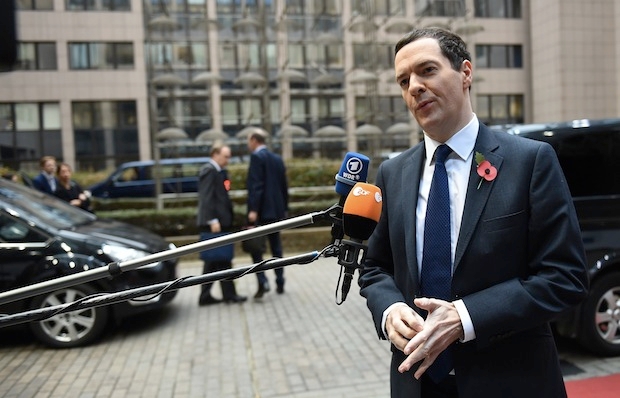After spending so many years pointing out Gordon Brown’s tricks and deceits, I had hoped for a bit of a retirement when George Osborne took office. No such luck. The Chancellor seems to have learned too much from his old nemesis and seems unable to resist stretching the truth – sometimes until the elastic snaps. So it proved with yesterday’s EU negotiation.
The Chancellor is blowing smoke, but it seems that the £1.7 billion bill has been halved automatically by the application of the UK rebate – in the same way that previous adjustments have been halved automatically by the UK rebate. Osborne’s achievement – a smaller, but genuine one – was to delay the payment.
Osborne should have said:-
‘I’m delighted that the EU have confirmed that the UK rebate, negotiated by Margaret Thatcher in 1984, will apply to this £1.7bn bill, as it does to all bills. This mechanism halves the amount to £850m. Moreover, the rebate will be applied a year earlier – next year, rather than 2016. And furthermore Britain, the Netherlands and other countries facing these new EU bills have negotiated delay in payments. The effect of this that we will pay nothing until July next year – with no interest to pay on the delay.’
That would have been an honest statement of a laudable achievement. But, being Osborne, he went a step too far – and made out as if he had halved the bill by some cunning negotiation tactics. There is, alas, no evidence that he actually negotiated a single a penny of reduction. A Commission official even told my colleague Anne Jolis yesterday that Osborne will have to pay the £1.7bn first, then get the rebate after.
Had Osborne played this straight, he would have been doing a lap of honour on Radio 4 this morning. Instead, the story was his spin. He found himself being challenged about his tricksy language (and what the FT calls a ‘sleight of hand’). He said this was coming from ‘critics of the government’. But all this is worse for those of us who are (broadly speaking) supporters of the government: such spin can turn victory into a defeat.

Would this shopper claim to have just negotiated a 50% discount?
You don’t need to be an expert on EU law to know the difference between an automatic discount and a negotiated discount. Would anyone step out of a Next new year sale and claim to have negotiated a 50pc discount on a suit? And expect their mates to take them seriously? It’s the same principle.
If the rebate was always going to apply, said Osborne on the radio this morning, ‘how come no one reported it? …Not a single person said this on the Today Programme.’ ‘We might have got it wrong,’ replied Sarah Montague – and she was right. The embarrassing truth is that no one – the media, Labour or Osborne himself – has been fully across the dynamics of this £1.7bn bill. But the EU works in ways that not even its auditors can understand.
So the Chancellor is right to say that there was confusion, not least on the part of the Prime Minister who seemed blindsided by by the £1.7bn bill even though Treasury officials knew for weeks that it was coming. But Osborne was given clarification on the amount yesterday, which is different to any negotiation. He ought not to have conflated the two.
To me, the most depressing thing is that such tiny tricks make voters less inclined to take Osborne at his word. A Chancellor's credibility is his most valuable commodity. Osborne remains far more credible than Ed Balls, but as the election draws near he ought to take greater care of this reputation.







Comments